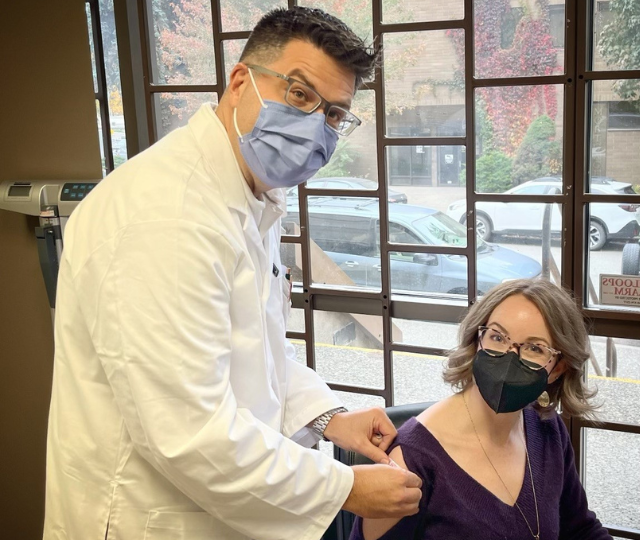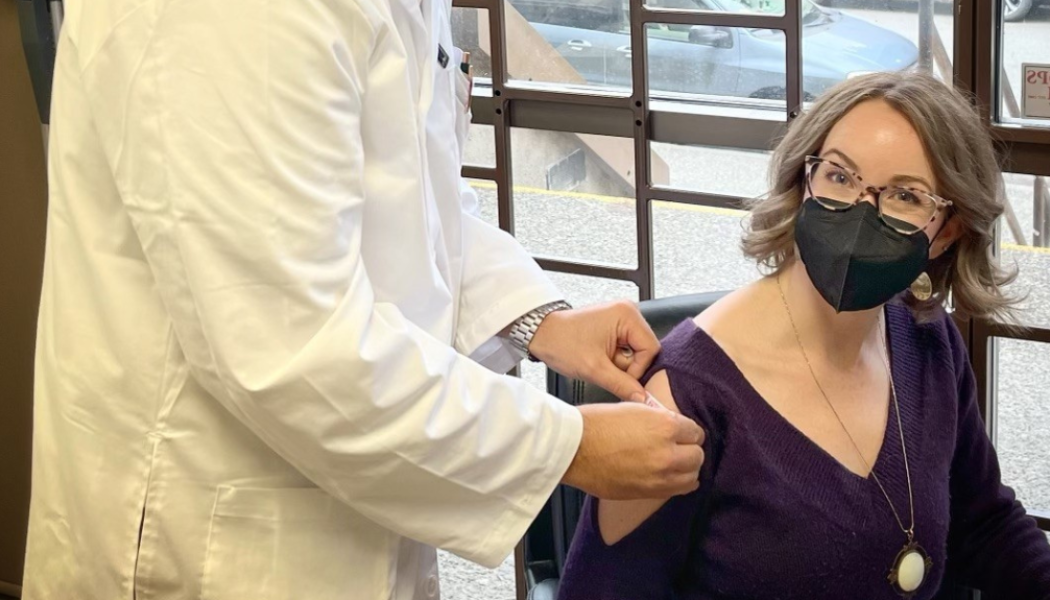Thinking about getting a flu shot this year? We asked Dr. Carol Fenton, a medical health officer with Interior Health, to share the questions she gets most often about influenza and the flu shot.
Make an informed decision and keep yourself and your family safe this winter.
What is influenza?
Influenza, sometimes called “the flu,” is a respiratory infection. It is like a cold but much worse. It spreads through droplets and from contaminated surfaces, especially in the winter.
Why do we see more colds and flu in the winter?
We do normally see more respiratory infections, like colds or flu, in the winter. This may be because we spend more time with others indoors, or it may be because these viruses can spread easier and survive longer when the air is less humid. Most likely it’s a combination of both.
How do I tell if I have a cold or if I have influenza?
Typically, with a cold, people feel unwell, they have a congested and runny nose, and they may have a sore throat or a cough. Fever is very rare with a cold.
Influenza is typically more severe, with fever, cough, muscle aches, and fatigue. For some people, this is as bad as it gets; for others, it can be so severe that they need to be hospitalized or they can die from it.
Why should I care about influenza this year?
In Canada, thousands of people are hospitalized and die from the influenza infection or from secondary infections like pneumonia during seasons when influenza is circulating through the population.
Last year, many public health measures to stop the spread of COVID-19 also worked really well to stop the spread of the influenza virus. This year, the restrictions are different so we need to make sure we continue to prevent influenza as well.
Who should get a flu shot?
The people who are at the most danger from influenza infections are young children and infants, the elderly, people who have lung conditions like asthma, people who have neurologic conditions, people who have blood conditions, people with diabetes, heart disease, kidney disease, liver disease, people who are on certain medications, and people who are immune compromised. These people need influenza vaccine to give their immune systems the ability to generate protection against the influenza virus. However, some of these conditions and medications may affect their body’s ability to generate really good protection from the vaccine.
The other people who need influenza vaccine are all those who come into contact with anybody who is at risk. If you know of or might interact with anyone in the previous group in the winter season, you also need an influenza vaccine to prevent spreading the virus to them. So, unless you don’t leave your house, you also need to be vaccinated for influenza.
Do I need both the COVID-19 vaccine and a flu shot?
Anyone who has not had a COVID vaccination in the last six months is no longer up to date so it’s time to get their fall booster. With the potential for both the influenza and COVID-19 viruses circulating this winter season, there is a chance you could be infected with both at the same time, which would be bad. A better choice would be to prevent both!
Who can get a free flu shot?
Anyone over the age of six months is eligible for free influenza vaccination. Get up-to-date information on the influenza vaccine by visiting the provincial Influenza vaccine (flu vaccine) page.
New in 2022, people will be able to book their influenza vaccine online through the provincial Get Vaccinated system. Booking through the Get Vaccinated system is the most efficient way to access an influenza vaccine
Learn more about getting an influenza vaccine this year
If I get my COVID-19 vaccine, do I need to wait a while before I get my flu vaccine?
No, there is no waiting period after getting your COVID-19 vaccine before getting your influenza vaccine, and vice versa. You could get one in each arm!
Besides getting both the COVID-19 and influenza vaccines, what else can my family do to keep healthy this season?
Now that respiratory viruses are circulating again, we need to redouble our efforts to wash our hands correctly and often, and disinfect high touch surfaces.
The best thing we can do is support people to stay home if they are sick. It’s still a good idea to wear a mask properly over your nose and mouth when you are in public indoor spaces.















